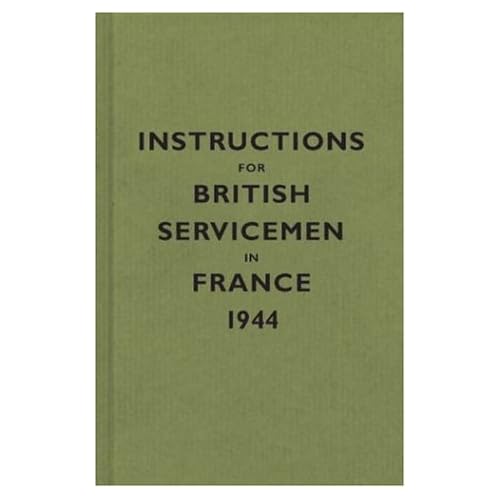
If you're looking for a guide to France, you could do worse than read the Instructions for British Servicemen in France, 1944, which Mme le Prof bought the other day. It makes fascinating reading for two reasons: firstly, a lot of its advice would be well heeded today by anyone abroad, and secondly because of the insight it gives into how the Brits saw (or were encouraged to see) France and the French. It's certainly a far cry from hop off you Frogs or cheese eating surrender monkeys!
Here's what it says about the fall of France in 1940: A great many of us [the British] ... blamed the French. [...] The French remember an aspect of the war which we sometimes forget: the fact that Britain was not overrun in 1940 was due not only to Mr Churchill and "the few" of the RAF, it was also due to our being protected by 20 miles of sea and the Royal Navy. If the Germans could have crossed ... the Channel ... are we quite sure that Britain would not have suffered the same immediate fate as France? (page 33). On the French military: It is time for us ... to think rather less about the French collapse and rather more about subsequent resistance in France (page 31). Remember, too, the heroic French stand made at the battle of Bir Hakeim and the way the French drove the Germans out of Corsica (page 32).
Hmm, I never saw that in the Sun or the New York Post.
There's plenty of stuff here that's still valid 60 years on: Drop any ideas about French women based on stories of Montmartre and nude cabaret shows. These were always designed as a tourist attraction for foreigners (page 26). Do not grouse at the French in general if you should meet a French "bad hat". There are probably one or two "bad hats" in every British unit (page 41), but my favourite is Remember to call them "Monsieur, Madame, Mademoiselle", not just "Oy!"
There are a few useful French phrases with pronunciation (commont-allay-voo? and Ee-ah-teel kel-kern key parl ongly?), and it makes the point that French nouns are masculine or feminine, noting that English is the only language without these gender complications (page 45), which sounds suspiciously like "English is simpler and easier than French". On the whole though, the guide is highly respectful of France: they [the French] think that France is a very great country, with a great record of civilization and they have every reason to do so.
But its general message is probably best summarised on page 11: There is another kind of thoughtlessness ... commoner among British peace time visitors abroad... It consists of airing the opinion that such and such a foreign country ... is very lucky to have chaps like us passing through ... It is amazing how many people ... can imply by their whole manner that the world in general, and the place where they have just arrived in particular, hardly come up to their standards. Well, that kind of attitude, however innocently silly, will be out of place in France.
60 years on, people still need to be told this kind of thing.
Here's what it says about the fall of France in 1940: A great many of us [the British] ... blamed the French. [...] The French remember an aspect of the war which we sometimes forget: the fact that Britain was not overrun in 1940 was due not only to Mr Churchill and "the few" of the RAF, it was also due to our being protected by 20 miles of sea and the Royal Navy. If the Germans could have crossed ... the Channel ... are we quite sure that Britain would not have suffered the same immediate fate as France? (page 33). On the French military: It is time for us ... to think rather less about the French collapse and rather more about subsequent resistance in France (page 31). Remember, too, the heroic French stand made at the battle of Bir Hakeim and the way the French drove the Germans out of Corsica (page 32).
Hmm, I never saw that in the Sun or the New York Post.
There's plenty of stuff here that's still valid 60 years on: Drop any ideas about French women based on stories of Montmartre and nude cabaret shows. These were always designed as a tourist attraction for foreigners (page 26). Do not grouse at the French in general if you should meet a French "bad hat". There are probably one or two "bad hats" in every British unit (page 41), but my favourite is Remember to call them "Monsieur, Madame, Mademoiselle", not just "Oy!"
There are a few useful French phrases with pronunciation (commont-allay-voo? and Ee-ah-teel kel-kern key parl ongly?), and it makes the point that French nouns are masculine or feminine, noting that English is the only language without these gender complications (page 45), which sounds suspiciously like "English is simpler and easier than French". On the whole though, the guide is highly respectful of France: they [the French] think that France is a very great country, with a great record of civilization and they have every reason to do so.
But its general message is probably best summarised on page 11: There is another kind of thoughtlessness ... commoner among British peace time visitors abroad... It consists of airing the opinion that such and such a foreign country ... is very lucky to have chaps like us passing through ... It is amazing how many people ... can imply by their whole manner that the world in general, and the place where they have just arrived in particular, hardly come up to their standards. Well, that kind of attitude, however innocently silly, will be out of place in France.
60 years on, people still need to be told this kind of thing.
Powered by ScribeFire.


